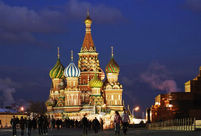 Shocking moments when PLA's weapons open fire
Shocking moments when PLA's weapons open fire Famous Lanzhou beef noodles
Famous Lanzhou beef noodles Armed Police hold anti-terrorism drill in SE China's Xiamen
Armed Police hold anti-terrorism drill in SE China's Xiamen Harbin Int'l Ice and Snow Festival opens
Harbin Int'l Ice and Snow Festival opens 'Jin' named the word of the year by cross-strait netizens
'Jin' named the word of the year by cross-strait netizens Chinese scientific expedition goes to build new Antarctica station
Chinese scientific expedition goes to build new Antarctica station
 Chinese naval escort fleet conducts replenishment in Indian Ocean
Chinese naval escort fleet conducts replenishment in Indian Ocean 17th joint patrol of Mekong River to start
17th joint patrol of Mekong River to start China's moon rover, lander photograph each other
China's moon rover, lander photograph each otherEDINBURGH, Jan. 10 -- Japanese Prime Minister Shinzo Abe's visit to the war-linked Yasukuni Shrine sent out a signal that should worry the world, said a Chinese envoy on a local Scottish newspaper on Friday.
In a signed article published by The Scotsman, Li Ruiyou, Chinese Consul General in Edinburgh, said Abe's visit to the shrine on Dec. 26, 2013 triggered a great deal of anger and condemnation by the peoples and governments of China, South Korea and other Asian countries.
Even Japan's ally, the United States, said it was "disappointed that Japan's leadership has taken an action that will exacerbate tensions with Japan's neighbors," said the article.
"Abe's homage to the shrine has harmed and bullied the feelings of the people of those nations victimized by Japanese aggression in the Second World War," it said, noting that the Yasukuni shrine honors 14 convicted Class-A World War II criminals among Japan's war dead.
The shrine was the spiritual instrument and symbol of Japanese militarism in its war of aggression and colonial rule during the World War II, which inflicted extreme brutalities on Asian nations, including the Nanjing Massacre and many other atrocities. China suffered as many as 35 million casualties and 600 billion U.S. dollars worth of direct and indirect losses, said the article.
By paying homage to such a shrine in his capacity as Japanese prime minister, Abe was "whitewashing the criminals of the war of aggression" and "once again rubs salt into the wound of some Asian nations," it stressed.
Nearly 70 years after the end of the war, Japan has still failed to correctly treat its past aggression and officially apologize to the victimized nations, as late West German Chancellor Willy Brandt did. The people of the victimized countries found it hard not to be indignant at Abe's behavior, it noted.
Abe, who has shown no remorse about Japan's militarist past and made no apologies for it since taking office in 2012, has, instead, done his utmost to beautify Japan's history of militaristic aggression and colonial rule, it said.
Abe's militarist attitude has made the victimized nations worried and outraged about the rising militarism in today's Japan, said the article.
Moreover, Abe has also attempted to amend Japan's post-war pacifist constitution, approving a new five-year defence plan that calls for the acquisition of drones and amphibious assault vehicles to strengthen Japan's military might -- another deviation from its post-war commitment to pacifism, it added.
The article quoted remarks made by German chancellor Angela Merkel's spokesman Steffen Seibert on Abe's visit to the shrine as saying that, "All nations must honestly live up to their role in the horrible events of the 20th century. Only on the basis of this honest accounting is it possible to build a future with former foes. This is a conviction Germany takes to heart and which in my opinion applies to all states."
Abe talks a lot about peace, but his actions apparently have taken the other direction. "Should he really want peace with his neighboring countries, why can't he face up squarely to the history of Japanese aggression and make sincere apologies officially to its victimized nations, as the German chancellor did?" asked the article.
 In photos: Ten 'tuhao' devices in 2013
In photos: Ten 'tuhao' devices in 2013 College students saved from an ice hole by brave citizens
College students saved from an ice hole by brave citizens Gallery: Top 10 box office hits in 2013
Gallery: Top 10 box office hits in 2013 Beautiful churches around the world
Beautiful churches around the world Yang Mi, Hawick Lau hold wedding in Bali
Yang Mi, Hawick Lau hold wedding in Bali 'Phubbing' people seen everywhere
'Phubbing' people seen everywhere World's biggest snack shop in China
World's biggest snack shop in China Shocking moments when PLA's weapons open fire
Shocking moments when PLA's weapons open fire World's fastest train CRH380A assembled in E China
World's fastest train CRH380A assembled in E China Top 10 box office hits in 2013
Top 10 box office hits in 2013 In photos: Ten 'tuhao' devices in 2013
In photos: Ten 'tuhao' devices in 2013 Real estate tycoon measures PM2.5
Real estate tycoon measures PM2.5  'I am on a journey to lose weight'
'I am on a journey to lose weight' 'Cute' artifacts exhibited in Nanjing Museum
'Cute' artifacts exhibited in Nanjing Museum Advanced Chinese weapons that stepped into spotlight in 2013
Advanced Chinese weapons that stepped into spotlight in 2013Day|Week|Month